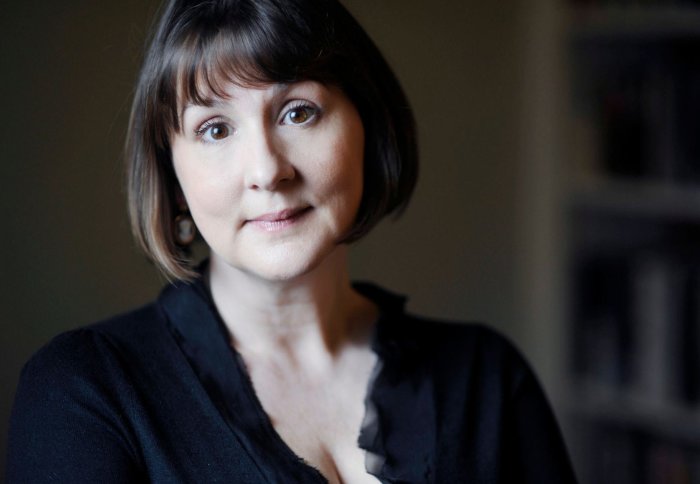Bringing science to life: From midwifery to interstellar space travel

Award-winning screenwriter, Heidi Thomas
As sci-fi and medical dramas prove a ratings hit for broadcasters, Murray MacKay explores Imperial's expertise in teaching Science Communication.
Surgery and science in the media
One of the UK's top screenwriters, Heidi Thomas, inspired guests at this year's Charmian Brinson Lecture on 13 November at Imperial. The Brinson Lecture is organised and hosted every year by the Centre for Languages, Culture and Communication.
"Take scientific facts, treat them with respect, burnish them, improve them, and from a storytelling perspective you can turn them into something truly magical." Heidi Thomas
Her hit TV series, 'Call the Midwife', has topped the UK ratings for seven years, and is seen in 197 countries worldwide. With a career spanning 25 years on stage and screen, Heidi’s work has been acknowledged and earned acclaim from the Emmys and BAFTA.
In her lecture she explored the connections between fact, fiction and emotional engagement when communicating with a mass audience. She also discussed research techniques, the technical challenges of bringing medical content to the screen, and using historical material to shine a light on the way we live today.
Heidi said: "Take scientific facts, treat them with respect, burnish them, improve them, and from a storytelling perspective you can turn them into something truly magical."

Learning from the best at Imperial
The whirlwind success of screenwriters such as Thomas, who diligently research their subject and try to bring technical details to life for audiences, highlights the increasing usefulness of communication skills for Imperial students and staff.
Dr Stephen Webster, who leads the College's Science Communication courses, said: "More and more, scientists are measured by the impact of their work, in their professional sphere, and also in society. I's a fact that impact requires communication. That means getting good at listening. If you do your homework, you’ll find that simple ideas of public ignorance or irrationality don’t get you far in understanding complex patterns of resistance to science. One such example is fracking.
"That’s why it’s good that we have science communication courses at Imperial, not just the MSc, but also the Societal Engagement Academy. We should be talking about ‘scientists’ understanding of the public’ as much as ‘the public understanding of science’."
The courses explore all aspects of speaking with the public and the media, as well as a particular focus on producing content that allows scientists to present their work in an accessible way.

Science Communication alumni, such as Alok Jha, have often moved on to work in prominent roles in the media. On graduating, he worked as a reporter at the science policy magazine Research Fortnight before joining The Guardian newspaper in 2003. He is now science correspondent at The Economist.
When providing a testimonial for the course, Alok said: "The MSc course took apart my rigid scientific view of the world and helped me realise that, while it's useful to think like a scientist if you want to be one, it's impractical for journalists writing for general audiences. You need to look at science from the outside, understand how non-scientists see it, to best communicate it."
The scientists behind the camera
Not all communicators become journalists, however. When Left Bank Pictures, producers of The Crown and Lost, were looking for someone to give their sci-fi adventure, ORIGIN, a touch of realism - they called upon an Imperial scientist. Thanks to his scientific consultancy work for filmmakers, artists and writers, they were introduced to Dr Roberto Trotta, a theoretical cosmologist who is renowned for translating ‘science-speak’ for a range of audiences.
The screenwriters wanted the space scenes to be breath-taking – but also plausible and grounded in science. Dr Trotta, who leads Imperial's Centre for Language, Culture and Communication, called upon his experience as a science communicator.
Dr Trotta said: “I worked with the writers on the mechanics of an interstellar voyage. We discussed what the ship would look like, how gravity aboard it would work, the kind of propulsion system the spaceship might use – and what kind of threats they could encounter.
“It was exciting. I was their sounding board. I was there to apply my knowledge and give their series the science-based realism needed to keep their worldwide audience engaged. Plus I had to delve a little deeper into my understanding of some aspects, so that was fun.”
“Collaborating with Roberto on our sci-fi series was as inspiring an experience as it was informative. Roberto is a natural born storyteller; he has the ability to bring incredibly complex ideas to life for those of us with a lesser grasp of the subject matter, whilst making it feel more like a conversation than a lecture.” said Alice Pearse, producer of ORIGIN.
Article text (excluding photos or graphics) © Imperial College London.
Photos and graphics subject to third party copyright used with permission or © Imperial College London.
Reporter
Murray MacKay
Communications Division
